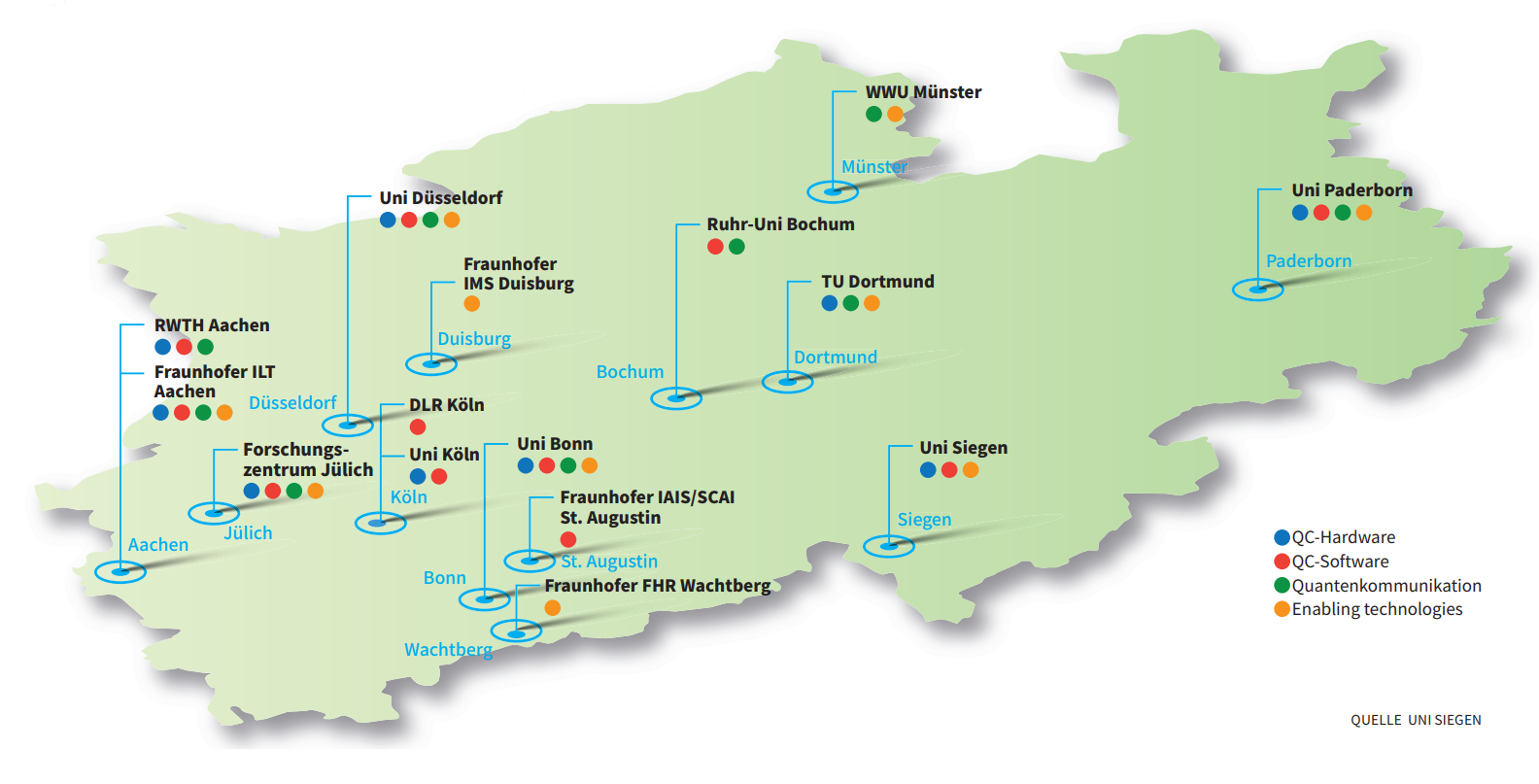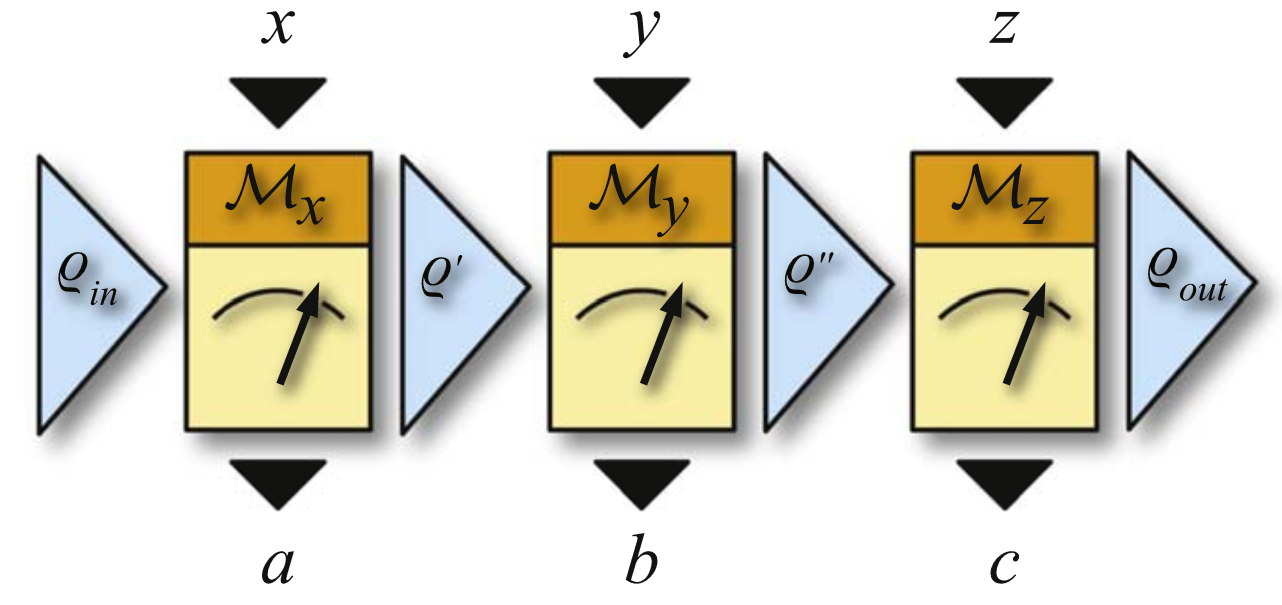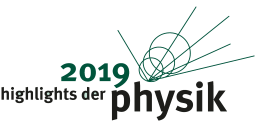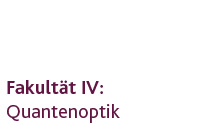Experimental Quantum Optics Chair
Welcome to the Experimental Quantum Optics Chair of Prof. Dr. Ch. Wunderlich at the University of Siegen.
Our experimental and theoretical work concentrates on the development and exploration of new schemes for quantum information processing using individual atoms and open fundamental questions related to quantum physics.
News
Fast, robust and laser-free universal entangling gates for trapped-ion quantum computing
06/26/2024
We have theoretically developed and experimentally implemented a novel radio frequency (RF)-driven conditional quantum gate. This 2-qubit gate gate is one order of magnitude faster than RF-driven gates in a static magnetic gradient field to date. In addition, this novel gate has built-in noise protection. It requires only a single RF driving field per qubit, which is advantageous for scaling up trapped-ion quantum processors. Improved ion traps will bring the speed of this gate to the same level as laser-driven gates, creating a new favorable perspective for scalable trapped-ion quantum processors. In addition, fast and robust RF-controlled entangling gates open new avenues for fundamental physics investigations using, e.g. quantum logic spectroscopy or for fundamental studies of entanglement.Robust two-qubit gates using pulsed dynamical decoupling
11/20/2023
We present the experimental implementation of a two-qubit phase
gate, using a radio frequency (RF) controlled trapped-ion
quantum processor. The RF-driven gate is generated by a pulsed
dynamical decoupling sequence applied to the ions' carrier
transitions only. It allows for a tunable phase shift with
high-fidelity results. The conditional phase shift is measured
using a Ramsey-type measurement with an inferred fringe
contrast of up to  .
We also prepare a Bell state using this laser-free gate. The
phase gate is robust against common sources of error. We
investigate the effect of the excitation of the center-of-mass
(COM) mode, errors in the axial trap frequency, pulse area
errors and errors in sequence timing. The contrast of the phase
gate is not significantly reduced up to a COM mode
excitation
.
We also prepare a Bell state using this laser-free gate. The
phase gate is robust against common sources of error. We
investigate the effect of the excitation of the center-of-mass
(COM) mode, errors in the axial trap frequency, pulse area
errors and errors in sequence timing. The contrast of the phase
gate is not significantly reduced up to a COM mode
excitation  20
phonons, trap frequency errors of +10%, and pulse area errors
of −8%. The phase shift is not significantly affected up
to
20
phonons, trap frequency errors of +10%, and pulse area errors
of −8%. The phase shift is not significantly affected up
to  10
phonons and pulse area errors of −2%. Both, contrast and phase
shift are robust to timing errors up to −30% and +15%. The gate
implementation is resource efficient, since only a single
driving field is required per ion. Furthermore, it holds the
potential for fast gate speeds (gate times on the order of
100 µs)
by using two axial motional modes of a two-ion crystal through
improved setups.
10
phonons and pulse area errors of −2%. Both, contrast and phase
shift are robust to timing errors up to −30% and +15%. The gate
implementation is resource efficient, since only a single
driving field is required per ion. Furthermore, it holds the
potential for fast gate speeds (gate times on the order of
100 µs)
by using two axial motional modes of a two-ion crystal through
improved setups.
Classical Half-Adder using Trapped-ion Quantum Bits: Towards Energy-efficient Computation
11/20/2023
Reversible computation has been proposed as a future paradigm for energy efficient computation, but so far few implementations have been realized in practice. Quantum circuits, running on quantum computers, are one construct known to be reversible. In this work, we provide a proof-of-principle of classical logical gates running on quantum technologies. In particular, we propose and realize experimentally, Toffoli and Half-Adder circuits suitable for classical computation, using radio frequency-controlled 171 Yb+ ions in a macroscopic linear Paul-trap as qubits. We analyze the energy required to operate the logic gates, both theoretically and experimentally, with a focus on the control energy.We identify bottlenecks and possible improvements in future platforms for energetically efficient computation, e.g., trap chips with integrated antennas and cavity QED. Our experimentally verified energetic model also fills a gap in the literature of the energetics of quantum information and outlines the path for its detailed study, as well as its potential applications to classical computing.
Improving complex Computer Vision Tasks with Quantum Computers
03/01/2022
Shape correspondence is a fundamental computer vision task in which vertices of 2D or 3D bodies are mapped to another. This represents a combinatorial optimization problem that takes a lot of time on classical computers. In the publication Q-Match: New approach for shape matching with Quantum Annealing our work group contributed to a new quantum computing approach, called Q-Match, to speed up this optimization problem.
ATIQ Project started: Implementation of quantum algorithms from chemistry and finance
02/28/2022

In the project "Quantum Computers with Trapped Ions for Applications" (ATIQ), quantum computer demonstrators are being developed together with users. The 25 project partners are tackling major technical challenges in order to realize German quantum computer demonstrators and make them accessible to users in 24/7 operation. The leading groups in ion trap research at the universities in Hanover/Braunschweig, Siegen and Mainz have joined forces with other leading research institutions and industrial partners for this purpose. The project is funded by the Federal Ministry of Education and Research. ATIQ indeed holds enormous potential for economic and scientific success. Quantum computers promise unprecedented computing power for applications where purely digital classical high-performance computers alone fail completely. The combination of a classical high-performance computer and a quantum computer, on the other hand, opens up completely new possibilities. There is therefore an urgent need for Germany to provide robust and scalable quantum hardware. The ATIQ consortium aims at optimized hardware for applications in chemistry. Novel chemical substances and the reactions to produce them could then be simulated on quantum computers. Another use case is in finance, where completely new approaches are being taken in credit risk assessment. The core of the quantum processor in ATIQ is based on ion trap technology, which is seen worldwide as one of the most promising routes to quantum computing. However, current systems are still complex laboratory machines with significant maintenance and calibration required by highly skilled personnel. ATIQ addresses the technical challenges to achieve continuous operation with reliable high quality computing operations. To this end, the ATIQ partners, in cooperation with technology and industry partners, optimize the control of the processors with electronic and optical signals and thus aim to achieve high reliability and availability so that external users can independently execute computing algorithms. In addition, such optimization also promises to scale up the quantum demonstrators from an initial 10 to eventually more than 100 qubits. The strength of the consortium is based on its knowledge as a developer of ion trap technology and the physical and technical fundamentals at the participating universities and research institutions.
Further partners are: Leibniz-Universität Hannover, Johannes Gutenberg-Universität Mainz, TU Braunschweig, RWTH Aachen, Physikalisch-Technische Bundesanstalt and Fraunhofer-Gesellschaft.
The companies are: AMO GmbH, AKKA Industry Consulting GmbH, Black Semiconductor GmbH, eleQtron GmbH, FiberBridge Photonics GmbH, Infineon Technologies AG, JoS QUANTUM GmbH, LPKF Laser & Electronics AG, Parity Quantum Computing Germany GmbH, QUARTIQ GmbH, Qubig GmbH and TOPTICA Photonics AG.
Associated partners are: AQT Germany GmbH, Boehringer Ingelheim, Covestro AG, DLR-SI, Volkswagen AG and QUDORA Technologies GmbH.
Pioneers in Quantum Computing
02/28/2022

The Frankfurter Allgemeine Sonntagszeitung reported in the article "Quantentechnologien in NRW" about the current research projects throughout NRW. At the University of Siegen, in the research group of Prof. Dr. Christof Wunderlich, the first German quantum computer was put into operation in 2010. It is based on the MAGIC (Magnetic Gradient Induced Coupling) principle, which allows to use commercial high frequency technology for qubit control. It also enables operations on individual qubits with unprecedented fidelity while minimizing crosstalk and providing high connectivity between qubits.
„Deterministic control of individual quantum systems is leading to a new paradigm in information processing.“ PROF. DR. CHRISTOF WUNDERLICH, UNIVERSITÄT SIEGEN
MAGIC quantum computer for industry and science: Start of research project MIQRO
05/17/2021
The joint research project MIQRO between the University of Siegen, Leibniz Universität Hannover , Heinrich-Heine-Universität Düsseldorf, QUARTIQ GmbH and eleQtron GmbH as an associated partner is funded by the BMBF and is scheduled to run for 4 years. The quantum computer developed and operated in this project will be scalable to a thousand quantum bits, paving the way for diverse industrial and academic applications beyond the capabilities of classical supercomputers. The MIQRO project will develop a breakthrough modular quantum computer built from quantum kernels that use stored atomic ions as quantum bits. The quantum logic operations performed in these quantum kernels – equipped with unprecedented functionality – are controlled by radio frequency (RF) waves. This is made possible by Magnetic Gradient Induced Coupling (MAGIC). The MAGIC concept is distinguished from other approaches by perfectly reproducible qubits, greatly reduced cooling requirements, and integrable high-frequency electronics for controlling qubits. Moreover, the simultaneous coupling of many qubits in a quantum kernel, while maintaining unrivaled small crosstalk between qubits, will accelerate quantum algorithms. Here, the MAGIC method will be extended to include new high-performance, microstructured trapped ion memories. This will enable high-fidelity quantum gates and quantum logic error correction, thus contributing significantly to the scaling of quantum computers. The quantum kernel developed and operated in this project, represents the core of a future ion-based universal quantum computer. This quantum computer will be scalable to a thousand qubits, paving the way for a wide variety of industrial and academic applications that are unthinkable today.

Aus Quantenregistern bestehender Quantenkern, welcher sich zu Multi-QPU-Systemen für erste industrielle Anwendungen skalieren lässt. © MIQRO/eleQtron GmbH
Within this joint project, the expertise of the
participating partners will be put to optimal use. For example,
at the University of Siegen, the conceptual basis for the
implementation of quantum logic operations envisaged here,
MAGIC, was developed and demonstrated. Together with the
Institute of Quantum Optics at Leibniz Universität Hannover,
headed by Prof. Dr. Christian Ospelkaus, the chips will be
specified and developed, extending the proven MAGIC method with
new high-performance, micro-structured ion processors. This
will make LUH's innovative microfabrication processes and
experience with the production of several generations of ion
traps fruitful for the collaborative project. With experts in
the field of quantum state measurement and reconstruction,
Heinrich Heine University Düsseldorf, with Prof. Dr. Martin
Kliesch as theory partner, is ideally placed to develop and
implement the necessary characterization and verification
methods. For the electronic control systems, MIQRO builds on
the leading developments of QUARTIQ GmbH led by Dr. Robert
Jördens, whose control software platforms ARTIQ and Sinara are
already used by research groups worldwide to control quantum
technologies and cover a broad requirement profile with
industrial-grade components.
Leibniz Universität
Hannover - Fakultät für Mathematik und Physik - Institut für
Quantenoptik, Hannover
Heinrich-Heine-Universität
Düsseldorf - Quantum Technology, Düsseldorf
QUARTIQ GmbH,
Berlin
eleQtron GmbH
BMBF
Quantentechnologien
VDI-TZ Düsseldorf
Quantum Futur Award 2020
11/13/2020

We congratulate Christian Piltz who was honoured for his PhD
work by receiving the nationwide
Quantum Future Award of the Federal Ministry of Education and
Research!
PhD thesis:
Maßgeschneiderte Spin-Spin-Kopplung und
Quanten-Fouriertransformation mit gespeicherten Yb Ionen in
einem Magnetfeldgradienten
Publications:
A trapped-ion-based quantum byte with 10−5
next-neighbour cross-talk
Versatile microwave-driven trapped ion spin system for quantum
information processing
Genuine temporal correlations can certify the quantum dimension
05/27/2020
 Temporal correlations in quantum mechanics are the origin of several non-classical phenomena, but they depend on the dimension of the underlying quantumsystem. This allows one to use such correlations for the certification of a minimal Hilbert space dimension. Here we provide a theoretical proposal and an experimental implementation of a device-independent dimension test, using temporal correlations observed on a single trapped 171Yb+ ion. Our test goes beyond the prepare-and-measure scheme of previous approaches, demonstrating the advantage of genuine temporal correlations.
Temporal correlations in quantum mechanics are the origin of several non-classical phenomena, but they depend on the dimension of the underlying quantumsystem. This allows one to use such correlations for the certification of a minimal Hilbert space dimension. Here we provide a theoretical proposal and an experimental implementation of a device-independent dimension test, using temporal correlations observed on a single trapped 171Yb+ ion. Our test goes beyond the prepare-and-measure scheme of previous approaches, demonstrating the advantage of genuine temporal correlations.

Computational art with quantum tricks
05/27/2020
From September 16 to 21, 2019, the highlights of physics in Bonn focused on how current physics research succeeds in making the invisible visible. The heart of the science festival under the motto "Show yourself" was an interactive exhibition on Münsterplatz. At each of the approximately 40 exhibits, scientists from Bonn and all over Germany were available for questions, explanations and discussions. With our contribution "Rechenkunst mit Quantentricks" we were able to show the basics of a quantum computer based on stored ions in a generally understandable way. The live demonstration of a functioning Paul trap, named after the former Bonn Professor Wolfgang Paul, invited to lively discussions on the topic of quantum computing. There were also science shows, live experiments, the Einstein Slam, a junior lab, workshops, a competition for schoolchildren, numerous lectures and lots of science to touch and try out.
